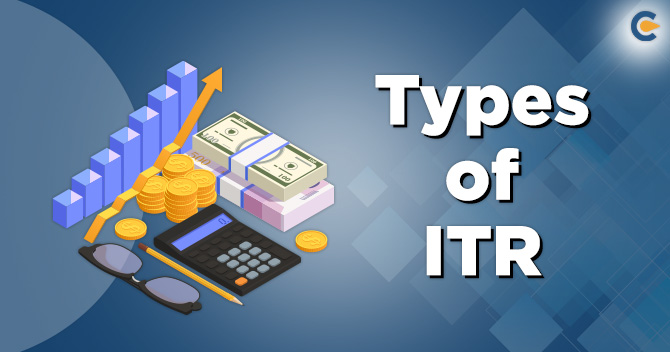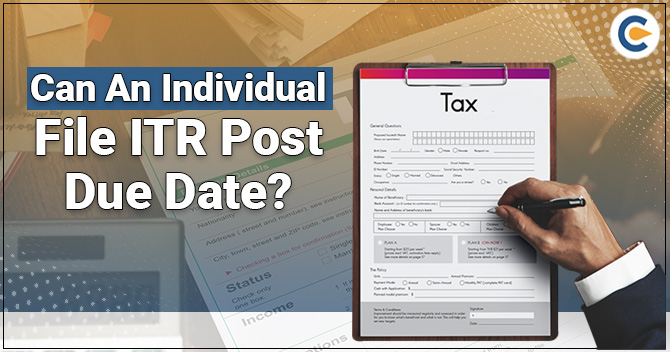In the growing world of digitalisation and interlinking of data from various sources, the government is keeping a keen eye on the undisclosed income. The need to disclose the income which one earns is increasing day by day. Income tax return form is medium through which an individual or any other registered entity is allowed to declare his income. There are different types of ITR [Income Tax Returns] forms which are available for any registered entity to file. One can choose the Income tax return form according to its own nature and nature of income earned. An income earned in a particular year is put to tax in the next year under normal circumstances. For example, an income earned in the financial year 19-20 will be going to be assessed in the next financial year. So assessment year for a particular financial year is always the one succeeding it. Like financial year 01.04.2019-31.03.2020 has its assessment year 01.4.2020-31.03.2021(A.Y 20-21). We call it an assessment year for the simple reason because income is assessed in this year.
Knowledge Dashboard Includes
- Meaning of an ITR and who is required to file an ITR?
- What are the benefits of Filing an ITR?
- Types of ITR
- Whether it mandatory to file an ITR
- What are the basic documents required for filing ITR?
- Manner of filing return
Meaning of an ITR and who is required to file an ITR?
As explained above, it a type of document having particulars like Name and address of the person, nature of business or profession, nature of its income, and other details, which makes it complete and comprehensive for the purpose of declaration of income. Any person who has earned any income should file suitable types of ITR [Income Tax Returns] form according to his nature of income. Any person who is earning more than amount, which is not chargeable to tax as per slab is required to furnish his Income Tax Return.
What are the benefits of filing an ITR?
There can be many benefits of filing and Income Tax Return out of which major ones are mentioned below:
- It helps maintain transparency by disclosure of income.
- It is of huge importance if someone wants to take a loan.
- It acts as a tool in calculating net worth of a person.
- It helps to get refund of tax paid from the government.
- These days, it acts as one of the most important tools in getting a credit card.
Read our article:Income Tax Return Filing without Form 16
How many types of ITR [Income Tax Returns] are there?
There are various types of ITR [Income Tax Returns] which are categorized on the basis of nature of person and nature of income which a person earns
In all, there are 7 types of ITR [Income Tax Returns] forms that any registered person under Income Tax can prepare and file to the Income Tax Department. Each form has its own set of requirements on the basis of which a person can choose his type of Income tax return form.
ITR-1
Applicability:
- Individual Assessee: Individual holding PAN and Aadhar who is a resident and not ordinarily resident having an income up to 50 Lacs
- Nature of Income: From Salary or pension, from single house property and from other sources like interest income.
Non Applicability:
- Individual Assesse :
- Being a director of company
- Was a holder of unlisted shares anytime during the previous year
- Is having any asset which is located outside India
- Is having any signing authority in any account which is located outside India
- Is having income from a source outside India
- Nature of Income :
- Income from business or profession
- Income from capital gains
- Income generated from more than one house property
- Income from lottery or from any activity of owning and maintaining race horses.
- Any income which is taxable at a special rate under 115BBDA or 115BBE
- Agriculture income in excess of Rs 5000.
ITR 2
Applicability
- Individual holding PAN and Aadhar and earning every nature of income mentioned in ITR 1 exceeding Rs 50L.
- Also, Director of a company and any person holding any unlisted shares of a company are allowed to use this form
- Income from foreign, from more than one house property and capital gain are covered here.
Non Applicability
- Individual earning income from business or profession shall not use ITR from 2.
ITR 3
Applicability
- Every Individual or HUF who is generating income from business or profession shall use this ITR form.
- Also, Individual who is not eligible to file ITR Form 1, ITR form 2, and ITR form 4 shall file this form.
ITR 4
Applicability
- Individual, HUF, Partnership excluding Partnerships who have generated income up to 50 lakh.
- Income included in ITR 1
- Income earned on presumptive basis under section 44AD, 44AE,44ADA.
Non Applicability:
If person covered:
- Being a director of company
- Was a holder of unlisted shares anytime during the previous year
- Is having any asset which is located outside India
- Is having any signing authority in any account which is located outside India
- Is having income from a source outside India
- Is having income from brokerage, commission, etc.
ITR 5
Applicability
This ITR can be used by the below-mentioned persons
- Firm, LLP, Partnership
- AOP/BOI
- Artificial Judicial Person
- Local Authority
- Society
- Trust not covered under ITR 7
- Business trust covered under section 139(4E)
- Investment funds covered under section 139(4F)
ITR 6
Applicability
Every company that is not claiming exemption under section 11 of the Income Tax Act[1] shall use this ITR form for the purpose of disclosing income.
ITR 7
Applicability
- Every person, including companies who are required to file return under section 139(4A),139(4B),139(4C),139(4D), shall use this ITR form.
- The persons who have been given unconditional exemption under various clauses of section 10 who are not mandatorily required to furnish their return may use this form.
Whether it is mandatory to file ITR for every person?
- Any Individual having income above the maximum amount not chargeable to tax as per slab is required to file an Income Tax Return.
- Companies, firms, and LLP doing business are also required to file appropriate types of ITR.
What are the basic requirements for filing an Income Tax Return?
- PAN
- Aadhar
- Bank Statements
- Bank Passbook
- Digital Signature
- Income Tax log in account
Manner of filing an ITR
- For the purpose of filing an ITR, one needs to have an Income Tax Log in account at first
- Once the login account is made, Income Tax forms are required to be downloaded from the official Income Tax Website of the government.
- Income Tax Forms need to be appropriately and filled and then Uploaded.
- These days, Digital Signature Certificate has become a necessary requirement for the purpose of filing an ITR.
Conclusion
In the ever-changing Information Technology word, which is moving more and more towards automation, it is the need of the hour that every person should file their types of ITR [Income Tax Return] and contribute to the development of the country. It is the taxpayer’s money that is being used for various development projects across the country. Since ITR filing has become fully online now, it is advisable to go through all the necessary instruction which is available just a click away and file ITR within due date and become a partner in nation-building.
Read our article:Income Tax Slab and Rate for financial year 2020-21











